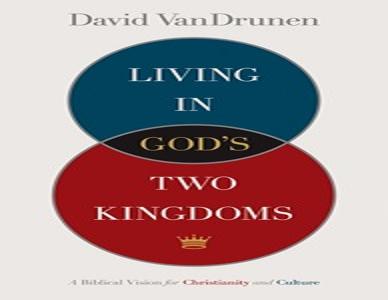Living in God’s Two Kingdoms
David VanDrunen, the Robert B. Strimple professor of Systematic Theology and Christian Ethics at Westminster Seminary California, has authored the new Living in God’s Two Kingdoms: A Biblical View of Christianity and Culture which can be obtained here. VanDrunen has elsewhere shown the historical pedigree of the two kingdoms doctrine within Reformed circles. This volume seeks to show how the doctrine can be fleshed out in our day.  The author seeks to offer a Biblical alternative to pietistic withdrawal from culture or a triumphalistic confusion of culture with the kingdom of God. Read on.
ADDENDUM
Dr. VanDrunen has written a clear and cogent argument for a two kingdoms doctrine. It should be noted up front that not every advocate of the two kingdoms doctrine holds to all the same details. Nor does holding to this doctrine preclude Christians from interacting with nonbelievers in the public square as anything other than Christians. One element that is challenged in this book and Dr. VanDrunen’s other volumes on this topic is the idea that believers can somehow bring in the kingdom of God by their human efforts. On the contrary, the church is the gateway into the kingdom of God and this kingdom is not of this world. There is a common grace realm or kingdom which is not neutral but which is shared with nonbelievers and there is the spiritual kingdom which is limited to believers and their children. Historically, it should be noted, a two kingdoms doctrine was common fare in Reformed circles so the frequent Lutheran label attached to this doctrine is inaccurate and frankly ignorant. If one is to challenge the doctrine it will have to be on the biblical and theological merits or demerits of the case without resort to shorthand name-calling. Questions yet remain. But careful thought and less knee-jerk reaction should be the rule of the day.
Also, I should note that Dr. VanDrunen presents his case for the two kingdoms doctrine within a fine redemptive historical setting.
Here is the outline for the book:
1. Introduction:Â Christianity, Culture, and the Two Kingdoms
Part 1:Â First Things and Last Things
2. The First Adam: Creation and Fall
3. Jesus Christ the Last Adam: Redemption and Consummation
Part2:Â Living in Babylon
4. Old Testament Sojourners
5. New Testament Sojourners
Part 3:Â Christian Life in the Two Kingdoms
6. The Church
7. Education, Vocation, and Politics
Read with discernment!




I’m looking forward to this one.
Jeff, is this R2K vs Tim Keller-ites really an extension of Clowney vs. Kline? How can they both be Vos/Ridderbos spin-offs?
Robert
Perhaps you are correct, although VanDrunen does not mention Keller (as far as my feeble memory remembers). Clowney and Kline can both be spin-offs of Vos and Ridderbos in the same way they can be spin-offs of Van Til-which they are.
The fact of the matter is that a master teacher does not always address every particular matter that could be addressed and so leaves room for divergent views or is vague and ambiguous. The other option is that a disciple disagrees at a given point with his master (think of Aristotle’s differences with Plato or Frame’s differences with Van Til or the vast differences between Jonathan Edwards and his so-called disciples in the school of New England theology).
Another possibility is that the master is able to hold together apparently paradoxical views that the disciples (perhaps being lesser thinkers or maybe better thinkers…) can.
I hope that helps.
Jeff
I meant to say that the disciples can’t hold together paradoxical views a master can.
Thanks, Jeff. I have to admit my phobia regarding R2K theology, since it appears to “chop up” the Bible to heavily. You do a good job, however, indicating how trends arise (and fall). Thanks for all your great input on Reformed Forum and here.
Pingback : tree removal tracy